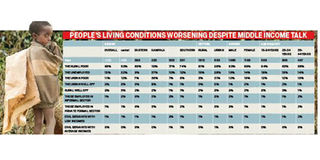66% rural poor living in bad conditions

Poverty. The survey indicates that eastern and northern Uganda remain the poorest parts of the country.
What you need to know:
- Poverty. The survey indicates that eastern and northern Uganda remain the poorest parts of the country.
KAMPALA. A survey designed to find out how people are surviving since this year’s general election has revealed that living conditions of the rural poor are getting worse.
Eastern and northern Uganda remain the poorest parts of the country, with very high poverty levels, the survey found. The survey by Research World International: Citizens perceptions on Uganda’s governance opinion poll 2016, was commissioned by Uganda NGO Forum. It shows that 66 per cent of those interviewed said no change for the better has occurred in their lives. Asked “Is there is a change in the living conditions since the 2016 general elections, 66 per cent of the 2,252 respondents sampled answered “No” with another 32 per cent of the respondents saying nothing has improved about the living conditions in the community since the 2016 general elections and only 3 per cent saying the economic conditions are very good,” reads the report.
The survey was carried out between September and October 2016 using a SPEC Omnibus survey across Uganda with a sample size of 2,252 respondents in 60 districts spread across the north, east, west and central regions.
This survey comes barely two months after a World Bank poverty assessment report for 2006-2013 (Poverty level in Uganda down by 11 per cent) showed that the proportion of Ugandans living below the poverty line has declined from 31.1 per cent in 2006 to 19.7 percent in 2013.
While releasing the report yesterday, the executive director of RWI Mr Patrick Wakida said during the interviews, 29 per cent of respondents indicated that they don’t know whether the economic conditions of Uganda will get better or worse in the next 12 months. About 28 per cent think the conditions will get worse, he added.
Mr Wakida said the survey covered social, economic, political and cultural issues in Uganda.
“The report reflects that the poorest of the poor are still in rural areas and the conditions are getting worse even when we are talking about getting to a middle income economy,” Mr Wakida said.
Mr Asuman Basalirwa, the JEEMA party president, said during yesterday’s function that many Ugandans remain uncertain about their household income because government seems to have run out of options.
“The survey shows that regional inequality persists and appears to be on the rise between urban and rural areas, which is not good for a country striving to move to middle income status,” Mr Basalirwa said.
Yesterday, the Special Presidential Assistant - Research and Information, Mr Morison Rwakakamba, observed that the report reflects a true picture of the country’s economy, but was quick to add that this is not only affecting Uganda but the entire world.
“It is sad that we are still a nature-based country but this economic pinch is not exclusively for Uganda. And when tomorrow the President shifts money from road sector to food, this is because our rural poor consider food a core basis of national security,’’ Mr Rwakakamba said.
The report showed that rural eastern Uganda is worst hit by poverty and poor living conditions at 80 per cent, followed by northern at 70 per cent and central at 53 per cent while Kampala was lowest at 10 per cent.
But the Information and ICT minister, Mr Frank Tumwebaze, has described the report as misleading and diversionary.
“I have not seen the report but what does it tell us about people’s purchasing power, is it increasing or decreasing? Researchers should stop misguiding people, you don’t measure the economy by asking people how they are doing economically but rather what their purchasing power is,” Mr Tumwebaze said.
He said between September and October, there was an increase in people’s purchasing power and that this a characteristic occurrence in the economy.
“Actually economists are fearing that in the month of December there is likely to be a lot of spending due to Christmas. Where is this money going to come from if the economy is not doing well? We should actually tell our people to rethink their expenditure this month,” the minister said.


